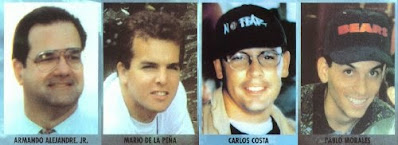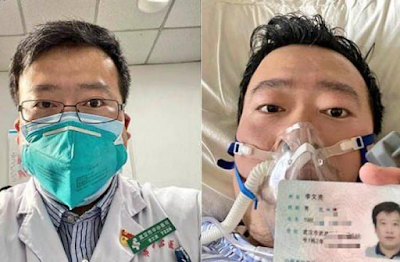"And we, without hatred, sow hope. We say socialism or death, no. Liberty and Life." - Oswaldo Payá
 |
| Oswaldo José Payá Sardiñas Feb 29, 1952 - Jul 22, 2012 |
Oswaldo's daughter, Rosa María Payá, over twitter today posted a photo in Spanish with the above quote by her dad in the original Spanish, with the following statement, here translated.
"In these days my dad would be celebrating his birthday, if hatred, made totalitarian power, had not killed him along with Harold Cepero. Hatred and death failed: they could not eliminate his legacy.#Homeland And Life#Freedom and LifeOswaldo Payá, Feb 29. 1952 - Jul 22 2012"
En esto días mi papá estaría de cumpleaños, si el odio, hecho poder totalitario, no lo hubiese hubiese asesinado junto a Harold Cepero.
— Rosa María Payá A. (@RosaMariaPaya) February 28, 2021
El odio y la muerte fracasaron: no pudieron eliminar su legado.#PatriaYVida#LibertadYVida
Oswaldo Payá, 29 feb. 1952 - 22 jul. 2012 pic.twitter.com/BEdadivGrp
Ten years earlier, Oswaldo Payá along with other members of the Christian Liberation Movement in May 2002 turned in thousands of signatures from the Varela Project, a petition that called for human rights to be respected in Cuba, and that the matter be debated before the National Assembly.
In December of 2002, thanks to lobbying and pressure from Spain, Oswaldo Payá was able to travel to Strasbourg, France to receive the European Union's Sakharov Prize and address the chamber.
In 2011, seven Norwegian members of parliament nominated Oswaldo Payá for the Nobel Peace Prize.( Václav Havel had also twice nominated Oswaldo Payá ).
Following the untimely deaths of Oswaldo and Harold, the Cuban opposition leader's family was subjected to death threats and heightened surveillance by state security.
Nine years later and his legacy lives on in Cuba, in the diaspora, and with his family. In 2019 his book "The Night Will Not Be Eternal: Dangers and Hopes for Cuba."
Movimiento Cristiano Liberación, Palma Soriano: Hoy recordamos a Oswaldo Payá en su 69 aniversario de su natalicio. Ejemplo de dignidad y coraje. Somos liberación.
— MCL (@oswaldopaya) February 28, 2021
Patria, libertad y vida. pic.twitter.com/0sX4DzO1AO
It is also a moment to share with others how others looking from outside the Cuban experience viewed this human rights defender and Cuban patriot. Below are observations made by Norwegian members of parliament in 2011 when they nominated him for the Nobel Peace Prize.
 |
| Norwegian members of parliament nominated Oswaldo Payá for Nobel Peace Prize in 2011 |
Norwegian MPs nominate Oswaldo Payá for Nobel Peace Prize
Source: Christian Liberation Movement
A group of 7 Norwegian Members of Parliament has nominated the Cuban Oswaldo Payá for this year’s Nobel Peace Prize. – The Nobel Prize to Cuba’s most important oppositional leader would be an important contribution to peace and democracy for a people who have been denied their fundamental human rights for far too long, the MPs write in their nomination letter.
Through nearly two decades Oswaldo Payá has been the leading figure in a peaceful struggle for basic human rights in Cuba. Oswaldo Payá represents all Cubans who want a peaceful change based on reconciliation and dialogue.
– We believe the Nobel Peace Prize would send a strong signal to the Cuban government that it is time for change, says Dagrun Eriksen, MP, deputy leader of the Christian Democratic Party and one of the signatories.
Oswaldo Payá has built his work on the conviction that all human beings have inviolable rights. He believes that the right to freedom of speech is the basis on which to solve all other problems in society. Only when the people themselves can express their concerns, Cuba will be able to find its own way out of the country’s challenges.
- Oswaldo Payá recognizes that freedom of speech and respect for fundamental human rights is a precondition for a peaceful development, says Jan Tore Sanner, MP, deputy leader of the Conservative Party and one of the other signatories.
Oswaldo Payá has consistently tried to work within the frames of Cuban law, through petitions calling for the respect for basic human rights. When the Varela project succeeded in collecting enough signatures to set of a referendum in 2002, the Cuban regime’s response, however, was to arrest 75 oppositional leaders, in what became known as the Black Spring.
Last spring, Mr Sanner and Mrs Eriksen took the initiative to form a support group for Cuban political prisoners in the Norwegian Parliament, including MPs from all the Norwegian parties. Following the release of more than 40 prisoners into forced exile last summer, 19 of them wrote a letter to the group, proposing that they nominate Oswaldo Payá for this year’s Nobel Peace Prize.
- The support from the former prisoners of conscience shows how Oswaldo Payá has succeeded in gathering different groups of dissidents in dialogue and peaceful resistance, says Dagrun Eriksen.
Jan Tore Sanner was one of the nominators behind last year’s winner Liu Xiabo.
- Oswaldo Payá represents the same peaceful struggle for human rights as Liu Xiabo, says Mr Sanner.
Payá has continued to call for unity and dialogue between all Cubans, in and outside the country. His National Dialogue program and All Cubans Forum, have involved thousands of Cubans in discussions on proposals for a peaceful change towards democracy. Payá is now again calling for a referendum on basic human rights.
- Oswaldo Payá would be a worthy winner of this year’s Nobel Peace Prize, say Dagrun Eriksen and Jan Tore Sanner.
























